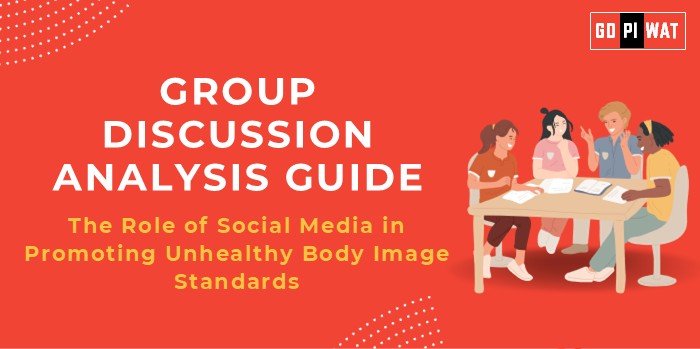📋 Group Discussion Analysis Guide
🌐 The Role of Social Media in Promoting Unhealthy Body Image Standards
💡 Introduction to the Topic
Social media platforms, with billions of users globally, are increasingly scrutinized for their role in shaping societal norms, particularly around body image. This issue is critical for B-school students exploring the intersection of media, marketing, and societal influence.
Historically, body image has been shaped by cultural narratives and media portrayals. The advent of social media has amplified these narratives, often glamorizing unattainable standards. Notable events, such as campaigns calling out Instagram’s impact on teenage mental health, have spotlighted this issue.
📊 Quick Facts and Key Statistics
- 🌍 Global Social Media Users: Over 4.9 billion (2023) – highlighting social media’s pervasive reach.
- 📱 Influence on Adolescents: 40% of teens report social media affects their perception of body image negatively (Pew Research, 2023).
- 🔍 Rise in Cosmetic Surgery: A 24% increase in surgeries linked to social media trends (ISAPS, 2022).
- 💸 Economic Impact: The beauty industry, driven by social media, was valued at $532 billion in 2023.
👥 Stakeholders and Their Roles
- Social Media Platforms: Algorithms prioritize visually appealing content, often propagating idealized standards.
- Advertisers and Influencers: Drive aspirational beauty narratives to promote products.
- Users: Act as both consumers and creators of body image content.
- Health Organizations: Advocate for media literacy and mental health interventions.
🏆 Achievements and Challenges
Achievements:
- 📢 Awareness Campaigns: Movements like #BodyPositivity have gained traction.
- 📜 Regulatory Efforts: Norway and France mandate disclaimers for edited images.
- 🛠️ Mental Health Support: Platforms like Instagram introduced well-being checks for users.
Challenges:
- 🤖 Algorithmic Bias: Promotes specific body types as “ideal.”
- 🧠 Mental Health Impact: Linked to anxiety, depression, and eating disorders.
- ⚖️ Regulation Gaps: Lack of comprehensive laws addressing body image issues globally.
Global Comparisons:
- 🇳🇴 Norway: Mandatory labeling of retouched images.
- 🇰🇷 South Korea: Shift towards “natural beauty” in advertising campaigns.
Case Study: The “Instagram vs Reality” trend has sparked debates on the harmful effects of edited content.
📋 Structured Arguments for Discussion
- Supporting Stance: “Social media democratizes beauty standards by offering diverse representations.”
- Opposing Stance: “Algorithms perpetuate harmful stereotypes, undermining diversity.”
- Balanced Perspective: “While social media amplifies body image issues, increased awareness can drive positive change.”
✨ Effective Discussion Approaches
- Opening Approaches:
- 📊 Cite alarming statistics on mental health and social media usage.
- 🌍 Reference global regulatory initiatives like Norway’s labeling laws.
- Counter-Argument Handling:
- Acknowledge the role of user behavior alongside platform algorithms.
- Highlight the effectiveness of campaigns advocating media literacy.
⚖️ Strategic Analysis of Strengths and Weaknesses
- Strengths: Broad reach; potential for positive influence.
- Weaknesses: Algorithmic focus on aesthetics; limited regulations.
- Opportunities: Partnerships with mental health advocates.
- Threats: Increased user cynicism; legal challenges for platforms.
📚 Connecting with B-School Applications
- Real-World Applications: Marketing strategies; corporate responsibility in advertising.
- Sample Interview Questions:
- “How can brands ensure ethical advertising on social media?”
- “Evaluate the role of regulations in mitigating social media’s impact on body image.”
- Insights for Students: Importance of ethical marketing; opportunities for wellness-focused startups.


